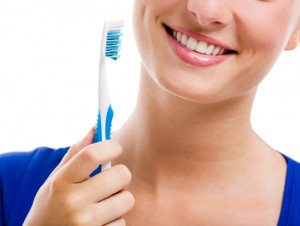 If you’re suffering from tooth loss, dental implants are the most preferred solution to replace missing teeth—no matter if you’re missing one tooth or all of your teeth. Implants are the perfect solution to fill the missing space using prosthetic teeth that are surgically inserted into the jawbone. While implants have a nearly 100 percent success rate, the success of your implants will depend on properly caring for dental implants. With the right maintenance and care, your implants can last a lifetime.
If you’re suffering from tooth loss, dental implants are the most preferred solution to replace missing teeth—no matter if you’re missing one tooth or all of your teeth. Implants are the perfect solution to fill the missing space using prosthetic teeth that are surgically inserted into the jawbone. While implants have a nearly 100 percent success rate, the success of your implants will depend on properly caring for dental implants. With the right maintenance and care, your implants can last a lifetime.
Caring for Dental Implants
Caring for your implants is very simple and only requires a few extra steps when maintaining your daily oral hygiene routine. Although there are extra steps involved, implants are still much easier to care for than dentures because you don’t have to remove them or deal with messy adhesives. With the proper care, you’ll help ensure your implants last a lifetime while reducing the risk for implant failure.
Your implants will last as long as you have good oral health. The number one threat to implant failure is infection. If an infection develops, it won’t just cause damage to the gums, but can extend down to infect the bones and supporting structures. When this happens, the bones and structures can begin to deteriorate, causing the bone supporting the implants to fail. Thankfully, there are many simple ways you can prevent infection and damage from occurring.
How to Care for Your Implants
Although implants are subject to decay, the bacteria that’s responsible for tooth decay can cause an infection to develop. As a result, you need to keep bacterial levels in the mouth to an absolute minimum. To remove bacteria, you’ll need to brush your teeth with a small tooth brush at least twice a day, preferably after every meal. It doesn’t matter if you use a manual or electric toothbrush as long as you are brushing well. In addition, be sure to use a toothpaste that is nonabrasive to avoid causing damage to the prosthetic teeth.
You’ll need to floss your prosthetics daily as well, but you’ll need to floss a little differently. Don’t just floss the teeth. You need to floss around the abutments of the implants as well to remove bacteria and food particles. When you’re finished brushing and flossing, use an antimicrobial mouth rinse to remove bacteria from areas you weren’t able to reach with brushing and flossing.
If you need extra help caring for your implants, an interdental brush will help remove the bacteria accumulation from the sides of the implants. You can also use disclosing tablets, which will stain areas of plaque to allow you to remove the buildup more effectively.
Finally, don’t forget to visit Piney Point Dental Implant Center for regular checkups and cleanings. We will remove areas you may have missed with your home regimen while checking for areas of concern. You will need to come in more often for cleaning, about 3 to 4 times a year, but by doing so, you’ll help ensure your implants last a lifetime for a beautiful smile.

